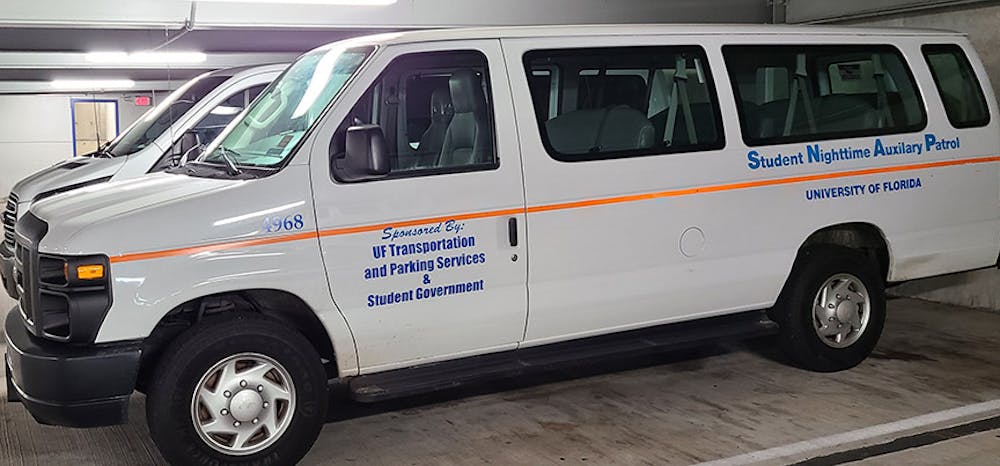The friendly faces of familiar drivers greet Jaden Thompson every time she climbs into a late-night Student Nighttime Auxiliary Patrol (SNAP) van.
“People are really nice on the SNAP,” she said. “It makes the ride much more enjoyable for me to be able to just converse with someone while I wait to go home.”
SNAP is a free on- and off-campus transportation service exclusive to currently enrolled students and staff, operating from 6:30 p.m. to 3 a.m. nightly during the Fall and Spring semesters and 8:30 p.m. to 3 a.m. every summer. Depending on demand, SNAP deploys between four and seven vans to roam campus that seat up to 15 people each.
The drivers, who are often UF students themselves, pick up passengers at 85 designated stops on-campus and at UF-owned off-campus locations, including downtown and midtown.
Students and staff can request rides through the UF SNAP app, which uses Gatorlink authentication, wrote UF Communications Director Amy Armstrong in an email.
By entering an address and the amount of people in a party, the app will provide directions to the closest time window and SNAP stop where drivers are only permitted to wait for a maximum of one minute for passengers after the van arrives.
The app provides a section for student feedback through ride comments, which Armstrong wrote is regularly reviewed for quality assurance and improvement.
SNAP also operates a wheelchair-capable, ADA-accessible paratransit minivan to provide transportation for disabled students as needed.
Thompson, a 20-year-old UF psychology junior, said she used SNAP almost every day during the Fall 2023 semester after the Gainesville Regional Transit System decreased its service to her usual route, causing her to rely on the vans for transportation to her off-campus apartment at late hours.
“Sometimes, I will be on campus really late doing homework,” she said. “They have a SNAP stop that’s less than a five-minute walk away from my off-campus apartment. A bunch of the SNAP stops on-campus are really accessible or walkable for me.”
However, Thompson said she had an even more important reason for frequently turning to SNAP: it’s safer than walking alone at night.
“It’s a lot more safe for me to be able to wait at a stop on-campus in the light versus walking through downtown,” she said. “Living off-campus is difficult because I wouldn’t say the city bus is the most convenient thing ever.”
Thompson said new students should “look out for the signs” labeled with the SNAP acronym to familiarize themselves with stop locations as they walk through campus.
Mina Edwards, a 21-year-old UF sociology senior, used SNAP most often while living in a dorm during her freshman and sophomore years. The vans drastically cut down the time it took to get across campus in the evening, she said.
Although she doesn’t use SNAP nearly as often since moving off-campus, Edwards said she encountered quite a few interesting drivers that added to the “vibe” of the ride.
“I had a few times riding with some friends to go downtown,” she said. “One time in particular, we had a driver that played a very strange ‘Frozen’ hyper-pop remix. That was definitely an experience.”
Davis Judd, a 21-year-old UF entomology senior, said he turned to SNAP “more times than [he] can count” during his time at UF.
“One night, I was downtown with some friends. We all had a bit too much to drink to drive,” he said. “I didn’t feel comfortable getting behind the wheel, so I used a SNAP.”
Judd said SNAP improved his campus experience, allowing him to attend more social events without his car. Students should take advantage of safe transportation, he said.
“If you have had anything to drink…wait for a SNAP,” he said. “It’s just smarter.”
Jillian Vinci, a 20-year-old UF kinesiology junior, said she used SNAP about five times during the spring semester, most often to travel to Midtown with her friends.
“I definitely like how it’s drivers our age,” Vinci said. “[They] know the ins and outs of the UF campus.”
Contact Sara-James Ranta at sranta@alligator.org. Follow her on X @sarajamesranta.
Sara-James Ranta is a third-year journalism major, minoring in sociology of social justice and policy. Previously, she served as a general assignment reporter for The Alligator's university desk.






